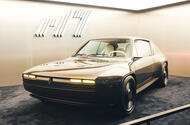Van den Acker said not all historic Renaults have the same commercial appeal as the 4, 5 and Twingo
Striking restomod of 1970s coupé has been met with acclaim but was intended “just to make noise”
Renault has no plans to put its striking 17 concept into production and will start to move away from retro designs now that it has revived some of its most recognisable models.
The 17 Electric Restomod was revealed recently as a reinterpretation of a lesser-known coupé from the 1970s, wearing a sleek new look, riding on a new carbonfibre chassis and being powered by a 270bhp rear-mounted electric motor.
There was speculation about the possibility of it evolving into a production car, but Renault Group design boss Laurens van den Acker has poured cold water on the prospect.
He referred to the 17 concept – created in partnership with designer Ora Ito – as a “brand kicker” designed “just to make noise”, like the Twingo concept that Renault did with Sabine Marcelin last year and the 4 by Matthieu Lehanneur, who designed the 2024 Olympic torch.
“These are not for you guys, in a sense,” he told journalists at the Paris motor show. “They’re for people that buy Vogue magazine or read the Monocle.”
And in response to calls for Renault to put a version of the 17 in showrooms, van den Acker suggested that not all historic Renault models have the same popular (and commercial) appeal as the new 4, 5 and Twingo.
“You have a selective memory when it comes to the past. Now we look at these cars and we say ‘look at how great they were’, but to be honest they were challenged,” he said, referring to the 17, which had a relatively short life and wasn’t especially popular.
The chances of a revival for the likes of the Safrane saloon, then, are minimal, suggested van den Acker – and even though “some people truly, deeply loved” the genre-busting Avantime of the 2000s, the short-lived two-door MPV won’t be coming back.
And while there is an appetite for a resurrection of some of Renault’s more recent and more mundane offerings, it’s not to the extent that the company would consider all options.
“People ask me ‘why don’t you do a Modus?’,” said van den Acker. “If you want a Modus, they are still available. Buy yourself a used one.”
Reviving a historic model is a difficult process, he explained, and to be successful, these retro creations must hold universal appeal, rather than just speaking to enthusiasts.
“These are difficult cars in the sense that they are right or wrong: either they hit the bullseye or they don’t.
“You need to capture what’s in the collective memory, of what comes up in your mind when you think about the Renault 4 or 5. It’s a tricky job, but ironically and surprisingly, when we tested the cars in market clinics, people looked at the 5 and they said it looked futuristic.”
Renault’s aim with the 4, 5 and Twingo is to cultivate appeal even across an audience that doesn’t remember the original models and for whom the names have limited significance.
“You can like it even if you don’t know the original car exactly,” he said of the 5. “The way it drives, the big wheels… It’s kind of a concept car made real, let’s be honest.
“For those who remember it, we’ve given them all the stuff to love, and for those who couldn’t care less, it’s just a nice car.”






